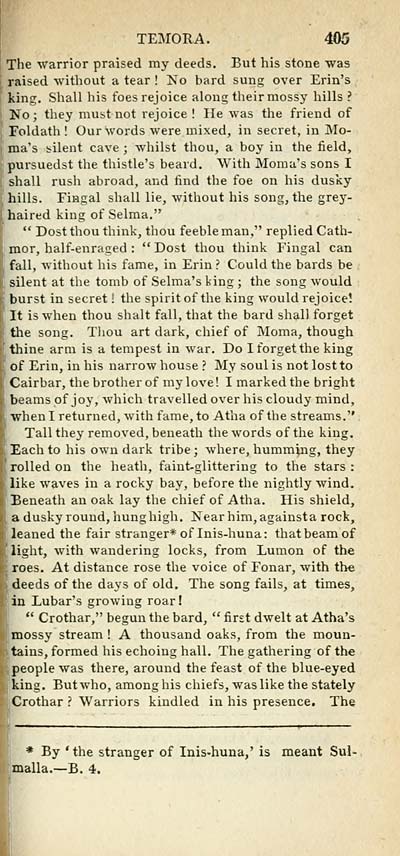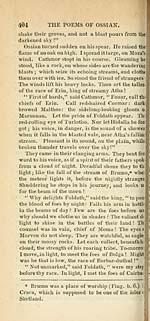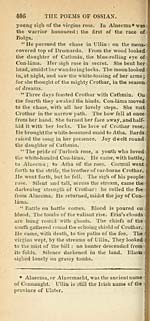Ossian Collection > Poems of Ossian
(453)
Download files
Complete book:
Individual page:
Thumbnail gallery: Grid view | List view

TEMORA. 405
The warrior praised my deeds. But his stone was
raised -Nvithout a tear ! No bard sung over Erin's
king. Shall his foes rejoice along their mossj- hills ?
No ; they must not rejoice ! lie was the friend of
Foldath ! Our Words were mixed, in secret, in Mo-
ma's silent cave ; whilst thou, a boy in the field,
pursuedst the thistle's beard. With Moma's sons I
shall rush abroad, and find the foe on his dusky
hills. Fingal shall lie, without his song, the grej'-
haired king of Selma."
" Dost thou think, thou feeble man," replied Cath-
mor, half-enraged : " Dost thou think Fingal can
fall, without his fame, in Erin? Could the bards be
silent at the tomb of Selma's king ; the song would
burst in secret ! the spirit of the king would rejoice!
It is when thou shalt fall, that the bard shall forget
the song. Tliou art dark, chief of Moma, though
thine arm is a tempest in war. Do I forget the king
of Erin, in his narrow house ? My soul is not lost to
Cairbar, the brother of my love ! I marked the bright
beams of joy, which travelled over his cloudy mind,
when I returned, with fame, to Atha of the streams."
Tall they removed, beneath the words of the king.
Each to his own dark tribe ; where, humming, they
I rolled on the heath, faint-glittering to the stars :
like waves in a rocky bay, before the nightly wind.
Beneath an oak lay the chief of Atha. His shield,
[ a dusky round, hung high. Near him, against a rock,
leaned the fair stranger* of Inis-huna: that beam of
light, with wandering locks, from Lumon of the
S roes. At distance rose the voice of Fonar, with the
j deeds of the days of old. The song fails, at times,
in Lubar's growing roar!
" Crothar," begun the bard, " first dwelt at Atha's
mossy stream ! A thousand oaks, from the moun-
tains, formed his echoing hall. The gathering of the
people was there, around the feast of the blue-eyed
king. But who, among his chiefs, was like the stately
Crothar ? Warriors kindled in his presence. The
* By ' the stranger of Inis-huna,' is meant Sul-
malla.— B. 4.
The warrior praised my deeds. But his stone was
raised -Nvithout a tear ! No bard sung over Erin's
king. Shall his foes rejoice along their mossj- hills ?
No ; they must not rejoice ! lie was the friend of
Foldath ! Our Words were mixed, in secret, in Mo-
ma's silent cave ; whilst thou, a boy in the field,
pursuedst the thistle's beard. With Moma's sons I
shall rush abroad, and find the foe on his dusky
hills. Fingal shall lie, without his song, the grej'-
haired king of Selma."
" Dost thou think, thou feeble man," replied Cath-
mor, half-enraged : " Dost thou think Fingal can
fall, without his fame, in Erin? Could the bards be
silent at the tomb of Selma's king ; the song would
burst in secret ! the spirit of the king would rejoice!
It is when thou shalt fall, that the bard shall forget
the song. Tliou art dark, chief of Moma, though
thine arm is a tempest in war. Do I forget the king
of Erin, in his narrow house ? My soul is not lost to
Cairbar, the brother of my love ! I marked the bright
beams of joy, which travelled over his cloudy mind,
when I returned, with fame, to Atha of the streams."
Tall they removed, beneath the words of the king.
Each to his own dark tribe ; where, humming, they
I rolled on the heath, faint-glittering to the stars :
like waves in a rocky bay, before the nightly wind.
Beneath an oak lay the chief of Atha. His shield,
[ a dusky round, hung high. Near him, against a rock,
leaned the fair stranger* of Inis-huna: that beam of
light, with wandering locks, from Lumon of the
S roes. At distance rose the voice of Fonar, with the
j deeds of the days of old. The song fails, at times,
in Lubar's growing roar!
" Crothar," begun the bard, " first dwelt at Atha's
mossy stream ! A thousand oaks, from the moun-
tains, formed his echoing hall. The gathering of the
people was there, around the feast of the blue-eyed
king. But who, among his chiefs, was like the stately
Crothar ? Warriors kindled in his presence. The
* By ' the stranger of Inis-huna,' is meant Sul-
malla.— B. 4.
Set display mode to: Large image | Transcription
Images and transcriptions on this page, including medium image downloads, may be used under the Creative Commons Attribution 4.0 International Licence unless otherwise stated. ![]()
| Early Gaelic Book Collections > Ossian Collection > Poems of Ossian > (453) |
|---|
| Permanent URL | https://digital.nls.uk/77993939 |
|---|
| Description | Selected books from the Ossian Collection of 327 volumes, originally assembled by J. Norman Methven of Perth. Different editions and translations of James MacPherson's epic poem 'Ossian', some with a map of the 'Kingdom of Connor'. Also secondary material relating to Ossianic poetry and the Ossian controversy. |
|---|
| Description | Selected items from five 'Special and Named Printed Collections'. Includes books in Gaelic and other Celtic languages, works about the Gaels, their languages, literature, culture and history. |
|---|

